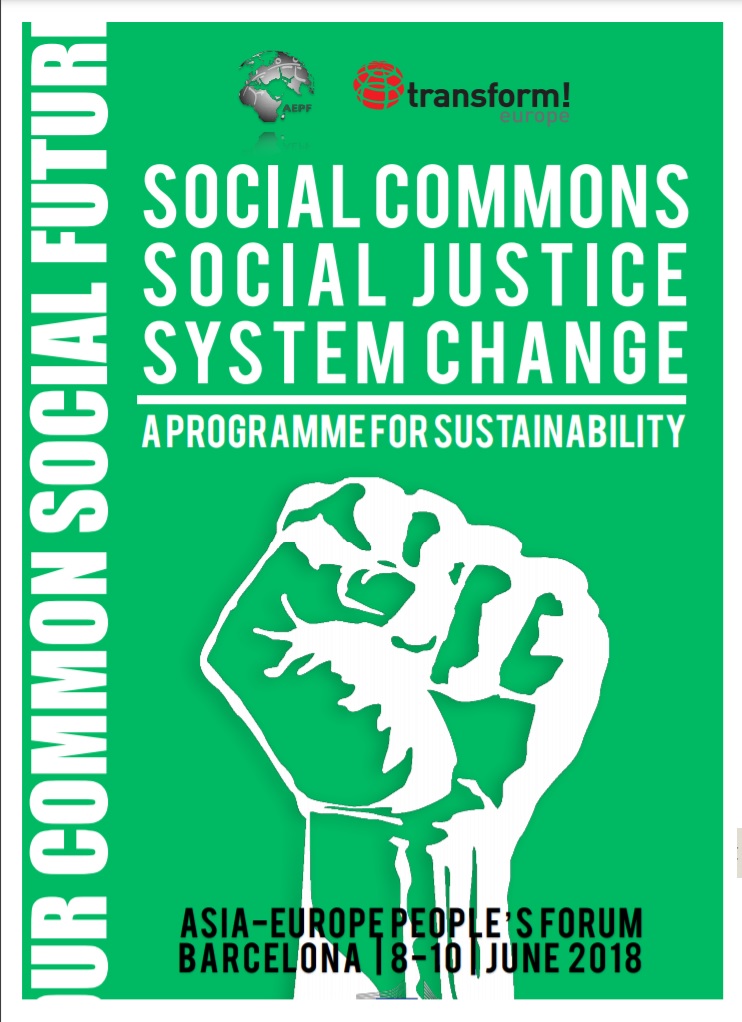Social Commons, Social Justice, Systems Change: A Programme for Sustainability
Progressive movements from Asia and Europe gathered in Barcelona to discuss the highly topical issue of social commons.
For the Asian movements of the Asian-Europe People’s Forum, the discussion was a continuation of a programme on social justice, after a conference in Manila on public services, and before the People’s Forum in Ghent and another conference in 2019 on labour.
For Transform! Europe,the conference was a continuation of a long-term project on commons, searching for alternatives to neoliberalism and the outdated statist programmes of parts of the left.
This common search for a future oriented perspective on social justice was very successful and allowed for opening a new horizon for political action and campaigns. The cooperation between scholars and activists was particularly helpful to identify the strengths and
weaknesses of this emerging new concept.
Apart from the stated objectives of the conference – clarification of the meaning of social commons, development of a new narrative, etc. -, the most important contribution seems to have been the links that were explained between different sectors, such as social, environmental, macro-economic and gender policies, production and re-production, amongst many others.
Most of all the interdependence of people and the interconnectedness of different issues made clear that no single issue can dominate the agenda. We need to work on all different fronts and at all different levels, simultaneously, from the economy to the labour market,
from social protection to climate justice, at the local as well as at the national, regional and global level.
This is indeed a daunting task, but cooperation like the ones established at this conference show that it is perfectly possible.
Different speakers explained the social situation in their country, which, in every case, had several similarities because of the growing inequalities and the persistent poverty. Contrary to many misplaced beliefs, commons are not a search for harmony, they cannot
peacefully exist in a neoliberal capitalist model, they are always a result of social struggle. This is also why they can contribute to social, economic and political change.
In order to achieve this the concept of commons invites us to think differently, to go beyond the current international initiatives for social protection, to think differently on ownership and property, to look differently at self-determination and self-governance.
Finally, the conference heard stimulating stories about how clever and efficient social policies, are helping people to live in dignity, and have been fruitful for progressive parties winning the elections.
To sum up, and as was stated in the final ‘Barcelona Declaration’ ‘by focusing on the collective dimension of our social and economic rights and by directly involving people in shaping public policies, the commons approach can become a strategic tool to resist neoliberalism, privatisation and commodification … Claiming and controlling social commons means building power together with others. It is a primary task for all progressive forces’.
Many important questions remain to be further examined such as the role of the State and other public institutions, the issue of scale and the transformational potential of commons. There is work to be done, but this work is directly related to the sustainability of life. Worth doing!
This is why the organisers of this conference thought the different presentations might as well be published, to remain a lasting contribution to the debates that will certainly continue and to inspire others to join this great effort.
It took some time, and we have not succeeded in collecting all the contributions, but we are sure that with the content of this booklet, a very important source of inspiration can be found for all those who want to work on solidarity, on social justice and on commons.
We thank more particularly Dr Anuradha Chenoy and Bishnu Singh for the editing work and Dr Francine Mestrum for the organisation and the lay-out. And of course Jen Derillo for the wonderful posters. We thank all the organising organisations for their precious contribution.




